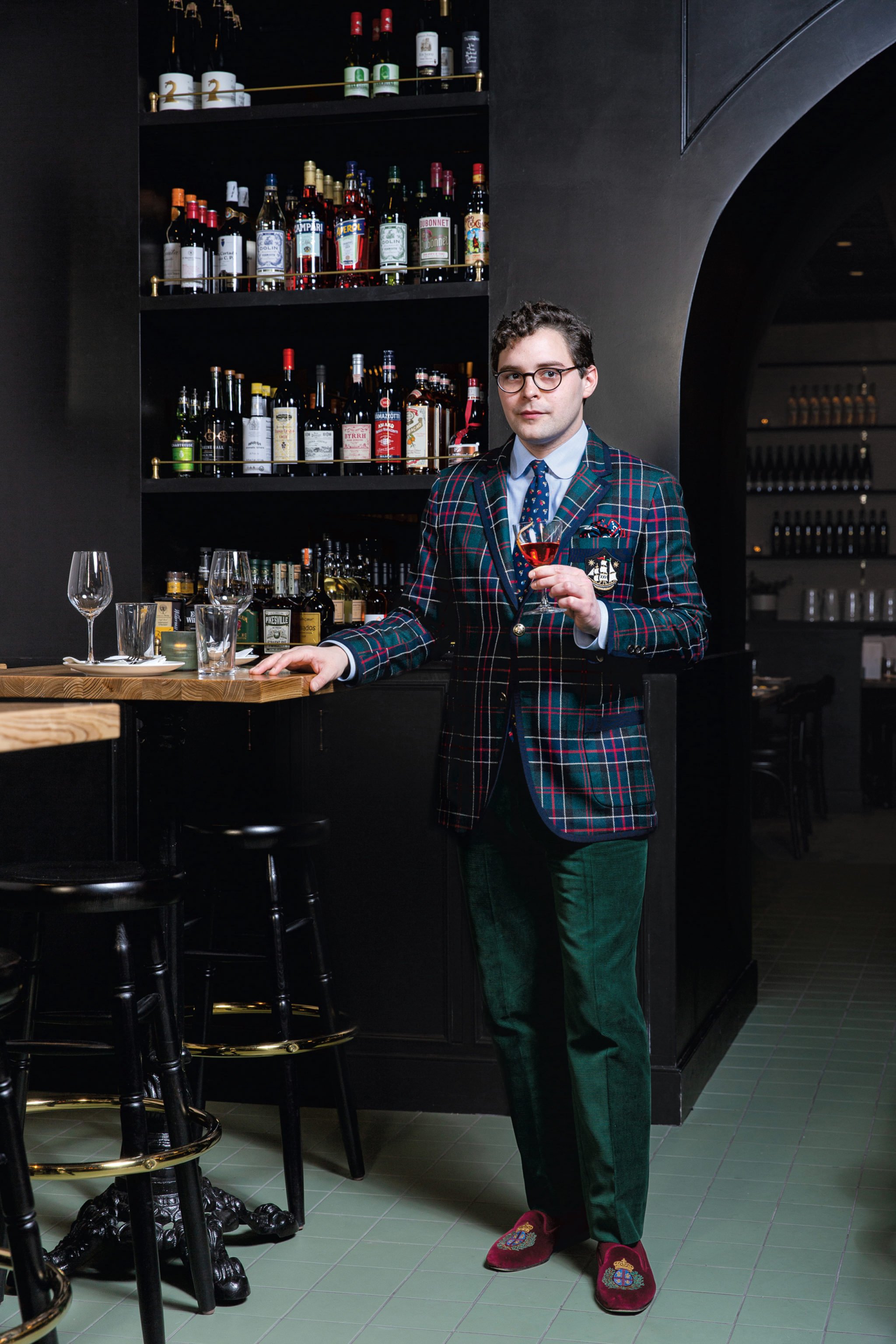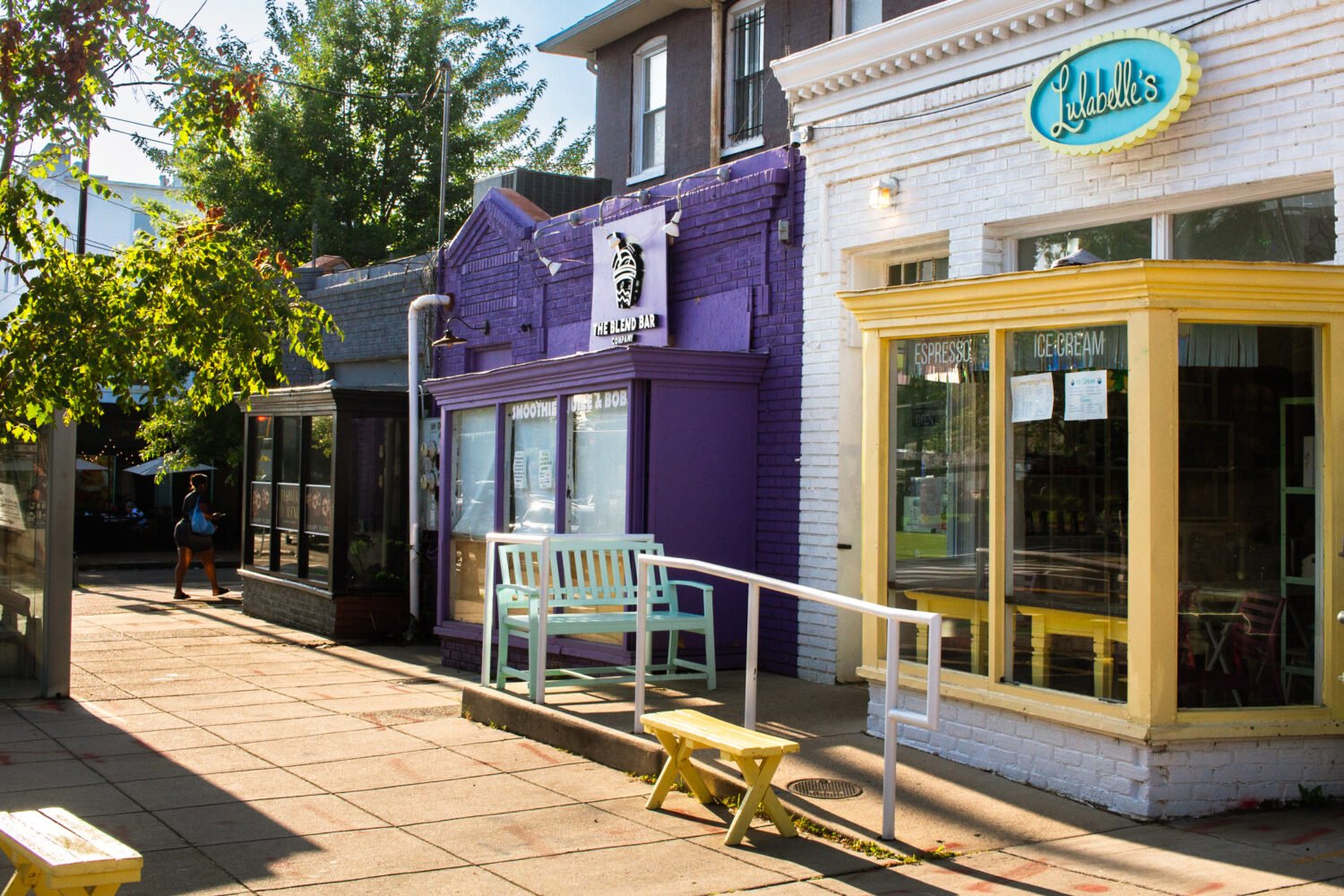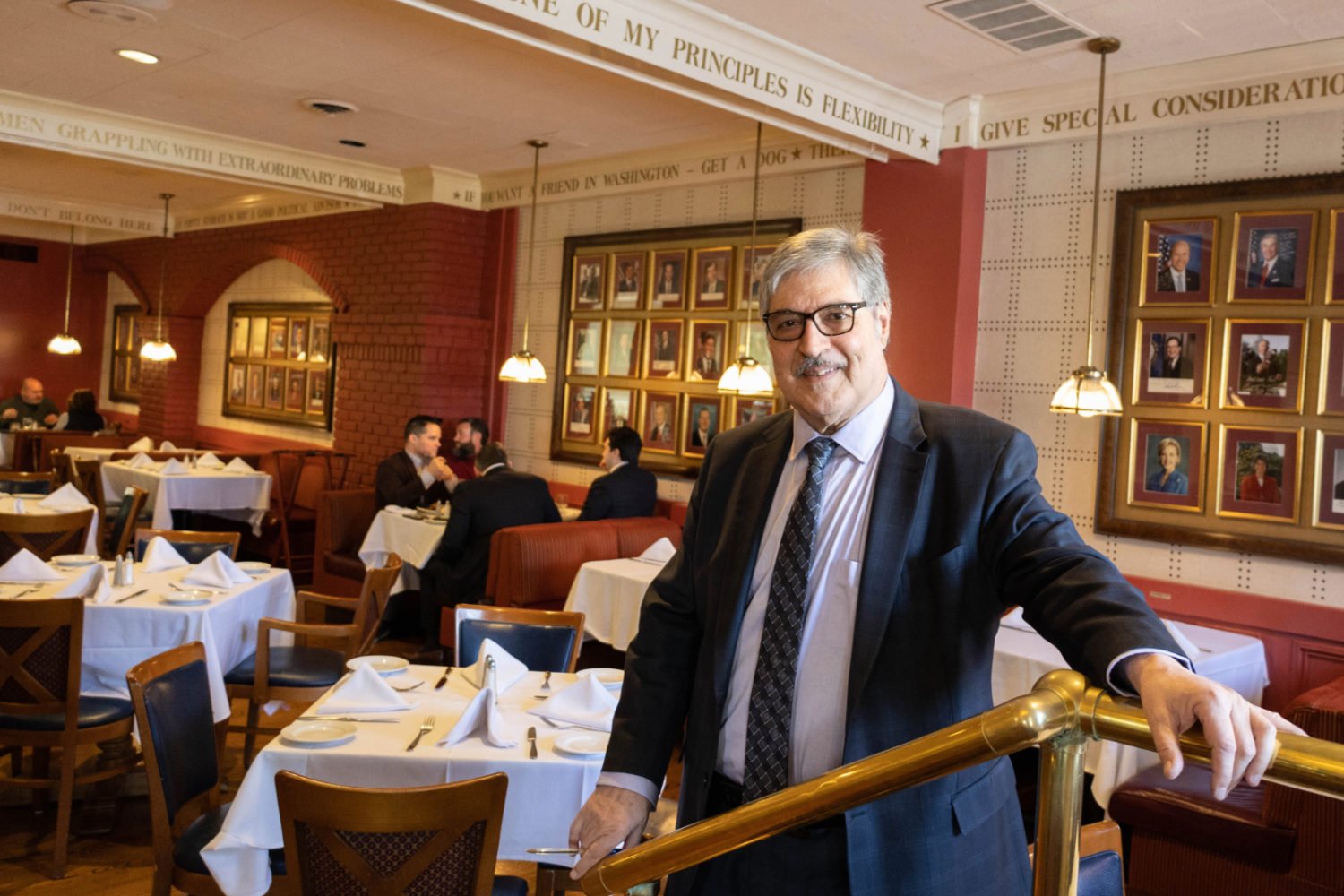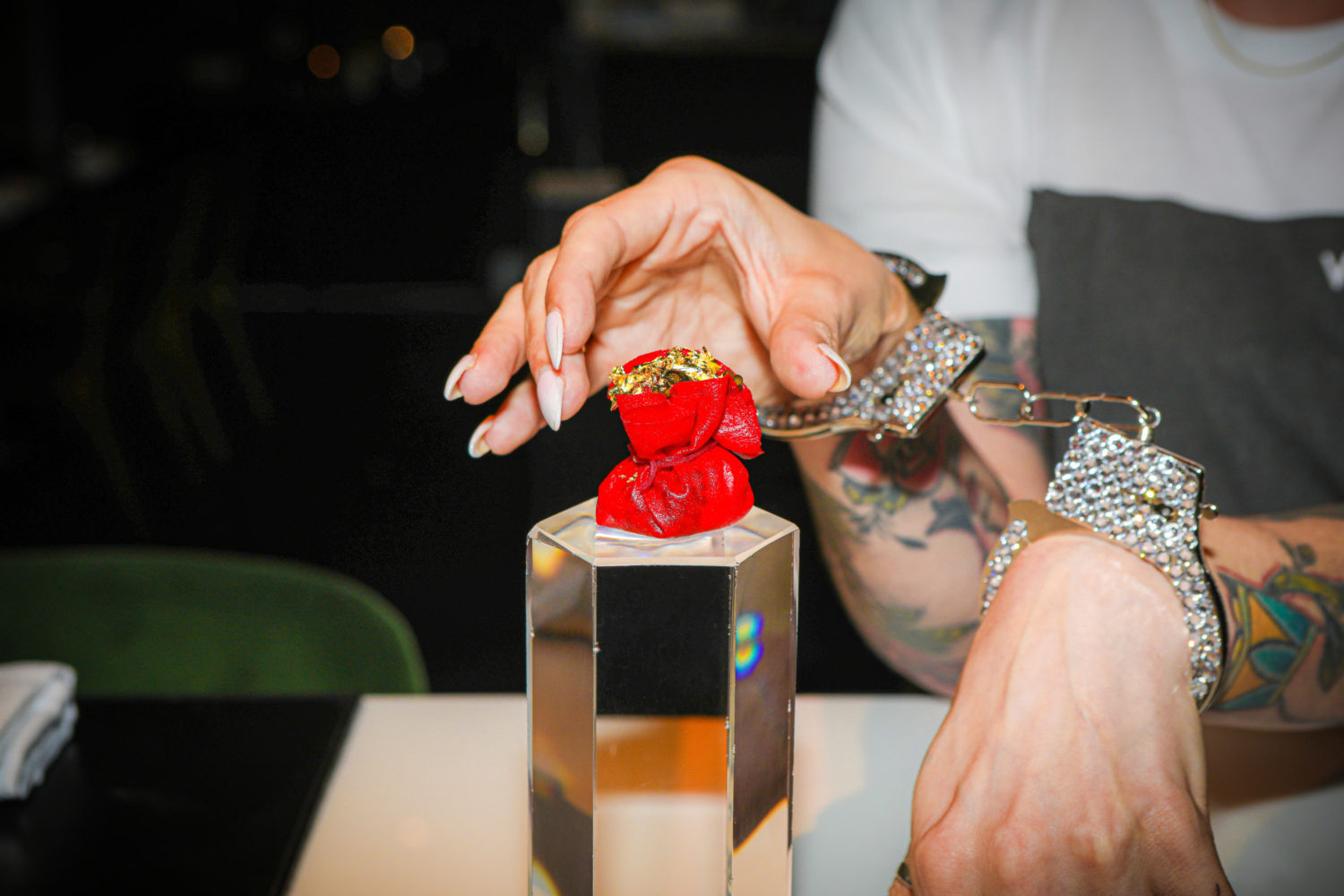Editor’s note: This story appeared in Washingtonian’s April 2020 issue. It was reported and written before the Covid-19 pandemic. Current operating status on the restaurants mentioned can be found in an update at the end of the article.
Christian Conner can’t remember how many times he’s been to the Dabney. Certainly not as many as he’s been to Fiola Mare, where he’s eaten more than at his own home—or “a lot lot, like over 100” times. But definitely more than Sushi Nakazawa, which he’s been “hitting hard” lately, hoping to surpass the only other person who’s frequented the $150 omakase den more than he has. What he can tell me is that he’s usually here every week. Makes sense: We just sat down for dinner and my menu contains a handwritten greeting reading “Welcome back.” His says “Welcome home.” Last year, the restaurant gave him a “Happy 50th anniversary” card. Not that kind of anniversary, mind you. The guy is only 28.
A parade of young female servers stop by our table, his usual, to say “Hiiiii” and “Oh, my God—I missed you.” They banter about their travels and compliment each other on their outfits. Conner has a preppy flamboyance that makes him look a little older, or maybe like he killed Colonel Mustard in the conservatory with a candlestick: navy pinstripe suit, paisley pocket square, Gucci loafers. (“At Komi,” he tells me, “they call me Gucci Man.”) He may be the only millennial in town who carries a briefcase, though not tonight, so his copy of Washington Square shares the table with his Cab Franc. (“I’ve been doing a lot of early Henry James, and now I’m doing late James.”)
Everyone wants to know how Conner’s been. “So awesome,” he says again and again. No wonder: Over the last four days, he dined at four of the city’s top restaurants—Tail Up Goat, Pineapple and Pearls, Komi, and Sushi Nakazawa (visit 31!). Typical week.
Conner grew up in West Virginia and moved to DC to be a Senate intern before getting a job with media-and-PR doyenne Tammy Haddad. But a year ago, he jokes, he “retired”—and did what any other 28-year-old with a lot of good years ahead of him might do. He plowed some cash into the restaurant scene.
He’s a funder of Reveler’s Hour, the new Adams Morgan venture from the Michelin-starred team that runs Tail Up Goat. He’s also starting an investment company to fund his own fine-dining spots.
So it’s safe to say the pockets of those pinstripe pants are deeper than those of the average twentysomething. Conner says he “did really well” in his four-year PR career and “had a little help from the fam.” (His grandparents owned a “very giant” flower business.) “I made a ton of money on Tilray,” the Canadian medical-cannabis producer with a famous stock run-up, Conner says.
And now he’s into food, a different kind of venture.
Taking a stake in a restaurant can be a little like buying a racehorse—highly prestigious, though not always hugely profitable. But Conner says he’s not in it for the cachet. Why would he be? Gucci Man is already a top VIP at DC’s best restaurants. “I’m not doing any of this to make a ton of money right away and smoke a cigar in the restaurant,” he says. “I think a lot of people who open restaurants, it’s their biggest, bro-iest idea.” He’s met some older investors like that. “They do it because they want a table at a place.”
No, what Christian Conner says Christian Conner wants is green kitchens for a greener planet. “I could invest in Big Pharma or oil or whatever, but I want to be a part of things that mean something. . . . I want every business that I invest in or am a part of to actually say, Hey, we’re good guys.” He wants fair wages, health care, and profit-sharing for restaurant employees—his friends, really—for a more equitable labor market and a just society. A say in shaping the future of the restaurant industry. You know, millennial-size ambitions.
As he lays out his plans, the Dabney’s head chef delivers us a $105 lamb platter and Conner snaps a pic for his Instagram, @the_king_drinks: “Hell, yeah.”
If you want to understand why the dining landscape looks the way it does, all you need to do is follow the money behind the scenes.
The invisible hands who helped fund our current roster of celebrity chefs and fast-casual empires have typically been lawyers and lobbyists, bankers and doctors—a lot of old, rich white guys. As Washington grew and grew and grew, they were there with cash to torch and egos to feed, hungry for cool places to bring friends, or at least a statusy way to diversify their portfolios. Bonus if their gamble paid off.
Now want to peer into the future of the dining scene? Start trailing the young money.
You already know that millennials are having an outsize impact on the food world as consumers (RIP, mayonnaise). But as investors, they’re poised to have an even bigger influence on where and how you eat. (Paper straws were just the start.) And the new cash comes with a whole new set of values. So long, “silent” investing. The next generation is here to build community and rectify injustices and save the planet, and while they’re at it, can they get a table this Saturday night?
Maybe you’ve heard of Emilie’s, the new Capitol Hill restaurant where dishes are delivered via cart, dim sum–style. Its 32-year-old chef, Kevin Tien, had a previous hit, Himitsu. Before Emilie’s opened late last year, everyone who followed food was waiting for his second act. That included potential investors.
Tien and his business partner, Sam Shoja (of the Jinya ramen franchise), had assembled $2.6 million to build the place out. But last summer, three months before the big debut, an investor named Johann Moonesing he arranged a meeting to discuss raising even more cash. They didn’t necessarily need the money. But “there are people who want to invest,” as Moonesinghe put it, “some cool people.”
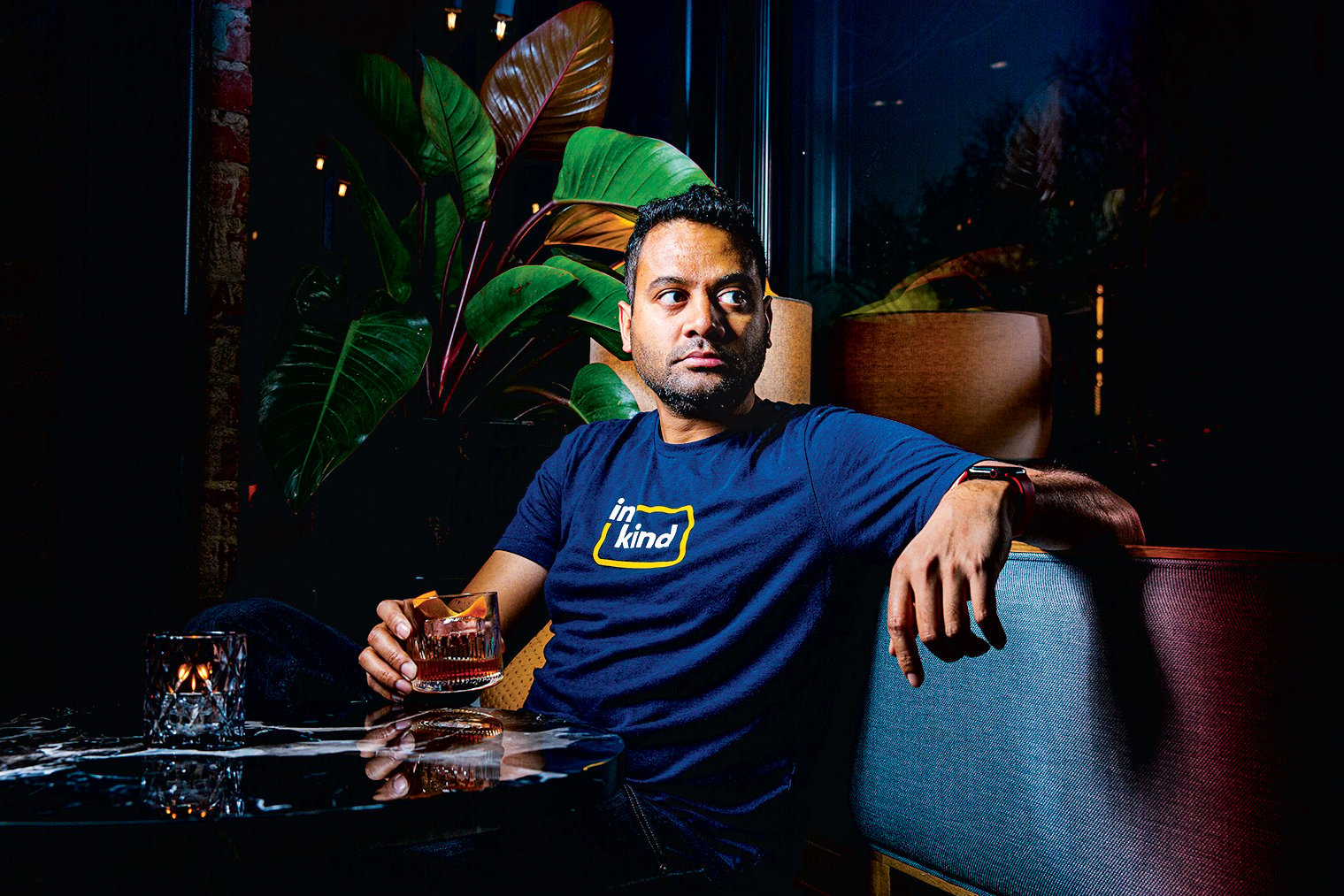
Moonesinghe wasn’t shy about sharing—inviting me along to watch how the new restaurant generation makes its decisions.
The 37-year-old made most of his money from tech investments—in Galley Foods, UrbanStems, and a small fund that struck gold as Uber’s first investor. These days, he runs the restaurant-financing platform inKind, collects wine (2,500 bottles across his homes in DC, Austin, and LA), and invests in restaurants—Maxwell Park, Black Whiskey, and, soon, Philotimo by Nick Stefanelli, to name a few. At Emilie’s, Moonesinghe is in for $500K. He arrived at the meeting Zuckerberg-casual, in shorts and sneakers.
The top question on the agenda concerned what kind of funders to bring in: Should Emilie’s add a couple $100K investors—or a bunch more at $25K?
To Moonesinghe, it was actually a question about demographics. A $100K check would likely come from the super-rich—folks who’d care mostly about having an in-credible dinner a couple times a year, may-be using the private elevator in the back.
The $25K crowd, on the other hand, would likely be younger, more inclined to think of their ties to the place as an extension of their personal brands—it would be more meaningful to them, so they’d be more involved, more helpful. “They’ll actually come up with cool ideas, creative ideas,” he said. “They’ll tell people about it, right?”
The rest of the team agreed. “I know eight people who would give me $25K,” said Arris Noble, a real-estate broker and another thirtysomething minority investor and “consulting partner.” Settled, then.
Next the group moved on to perks, which come along with a contract between a restaurant and its silent investors. To be clear, Moonesinghe and many other new-generation investors are just as interested in traditional extras as anyone else is—access to tables, no corkage fee, first dibs on guest-chef dinners. (“Like first drop on the new Yeezys,” Tien interjected, name-checking the coveted Kanye West sneakers.) But just as quickly, the discussion pivoted to a theme that’s extra important to younger investors: giving them that feeling of family, of community.
Noble suggested inviting everyone to the staff holiday party or the employee-of-the-year awards. “I’d be privileged to be a part of that process or just be there and celebrate, because then I know what I’ve invested in is good and they’re taking care of those people,” he said.
And obviously, T-shirts. “At Maxwell [Park], probably the biggest perk that everyone loves is T-shirts,” Moonesinghe said. “It’s a big deal.” Definitely T-shirts.
Silent investors have traditionally operated like the name says: silently. They don’t decide what’s on the menu or get in the weeds of operations. The new class of funders, though, don’t typically like to keep their mouths shut. Yeah, they’re still buying status. But for their generation, a big part of the status comes from being heard.
Adam Williamowsky, who consults on restaurant investment for the retail and real-estate firm Streetsense, sees this firsthand. Owners will blast out the latest financial reports by e-mail, and younger funders can’t help but toss salt into the pot. “The younger generation, because we’re connected 100 percent of the time, we’re used to responding and being more vocal,” Williamowsky says. “They’re questioning everything: ‘Is this being run the right way? Why can’t we save money doing this?’ ”
It’s not that boomers never speak up, but millennial investors tend to do it a lot more often—and not always from a place of expertise. Williamowsky remembers one millennial investor excitedly telling a restaurateur just to redo a whole section of the room, apparently unaware of how complicated such an endeavor might be. At the same time, younger investors who came of age in the era of restaurant fetishisizing can be valuable to have in-house. Competition among restaurants is cutthroat. And when you have ride-or-die boosters who constantly tag your spot on Insta and make it their business to keep it buzzy, you want them to feel influential.
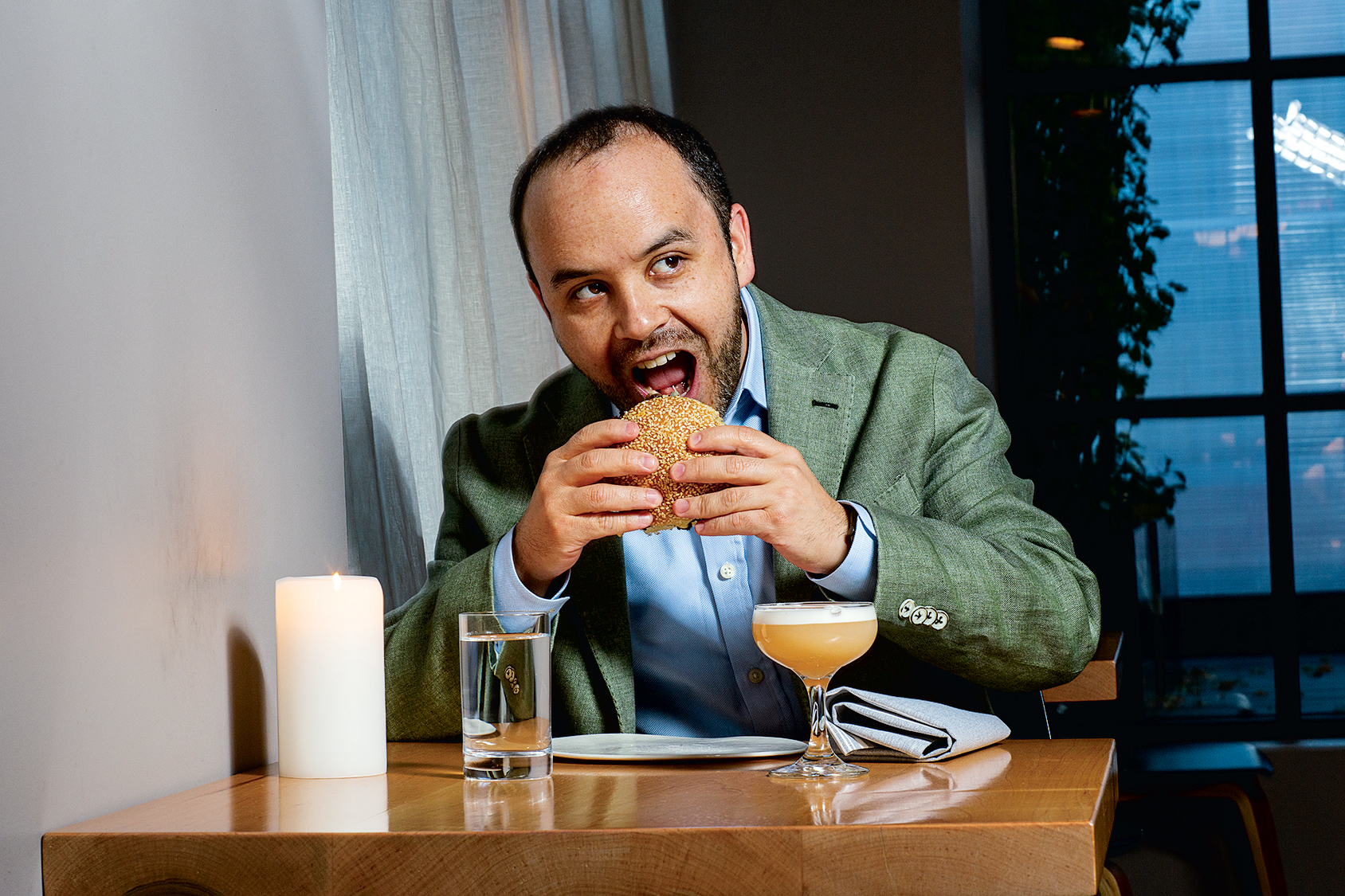
Johnny Spero, the 34-year-old chef/owner of Georgetown’s Reverie, says about half of his investors are millennials: “They are completely open and honest about things that they like and they don’t like. We’re not going to change the concept of what the restaurant is, but I want to know what they think, because they’re the ones out there selling us.”
Maybe it won’t surprise you to know that Spero also digs how the young funders treat him like a friend rather than a hireling. They comment on his Instagrams and swing by off-hours to catch up. “They’re not just coming in and asking, ‘Hey, what are the numbers?’ They ask how am I doing. ‘How’s your wife? How’s [your daughter] Fiona?’ ” he says, adding, “They know everything about my life.”
When I meet one of his most vocal investors, Ignacio “Iggy” Jacome, for dinner, the 37-year-old is wearing a pin with Reverie’s logo—three intersecting diamonds—on the lapel of his green linen blazer. Spero gave the pin to all the funders when the place opened in 2018. Jacome rarely comes in without his. “Pins tell you ‘This is part of who I am,’ ” he says. “I wear it because I’m proud of it.”
A finance guy at the Inter-American Development Bank by day, Jacome also accrued cash by investing in Bitcoin and living with his parents until he was 28. There was a time when he flipped houses on the side. But somehow that didn’t feel quite as “real” as restaurants. There are no special pins in house-flipping.
At Reverie, Jacome is in every few weeks. “I saw this place when there was nothing. I went, ‘Wow, the ceiling is kind of low, don’t you think?’ [Spero] was like, ‘Don’t worry about it—it’s going to be perfect.’ And you see it now, and it’s like, ‘I helped this to be created.’ ”
Jacome helped recruit other money: “I’m very social. I like to go out and party. I could have just said, ‘I’m going to invest in this, and I could be the rock star that invested in this incredible space.’ But will I be that guy? No. I want my friends also to get involved.” College buddies and guys from his soccer league bought in. So did his dad.
Jacome gives feedback, good and bad, on every meal and isn’t afraid to recommend changes. “I told [Spero], ‘I don’t think the wine list is the best,’ ” he says. “You have a table of four or six people, you’re having fun, you’re enjoying your night out, you finish your first bottle of wine. If it’s not a good bottle, you’re not going to ask for the second one. And that’s margin right there.”
Before long, the wine list was changed.
“We’re all looking for purpose, right?” says Patty Sung, who’s 39 and obviously wise to every millennial trope.
When I first met her, Sung, one of only a few younger female investors I came across, was carrying two iPhones in millennial-pink cases, one for home and one for work. A soon-to-be startup COO, she was then an “innovation leader” at Mercer, the multi-national consulting firm—restaurant in-vesting is her “fancy side hustle.” She and her husband back Pluma by Bluebird Bakery, near Union Market, and they’re the biggest investors in Flight Wine Bar, in Chinatown. The bar was started by her husband’s business-school friend and his lawyer-turned-somm wife. Sung says when they wrote the check, the friends told them, “We need to add an extra zero.” So they did.

The couple moved here from New York and chose their CityCenterDC apartment to be near Flight. They don’t go out a lot, just, you know, four times a week . . . with a three-year-old. Now the bar is kind of like a second home. They have their regular table near the office, which doubles as their diaper-changing room. “Even my daughter knows the layout of Flight so much that she comes in, she says hi to everyone, and she goes to her table,” Sung says. “There’s a comfort that you get being part of the business that you don’t get anywhere else.”
And yes, purpose.
Especially in a self-actualization sense. At a global corporation, you’re a speck on the map. In a business that spans 75 seats on a sliver of a city block, you’re “building up the community” and “spark[ing] economic development” and “helping a business grow.” Sung taste-tests before Flight hires a new chef. She volunteers marketing ideas. When the wine bar has been short-staffed, her husband has helped do the dishes.
A decent ROI would be nice, sure, but that’s not the point.
For as long as I’ve covered it, restaurant investing has been a financial decision in which people rarely talk about the financials. Today’s young, rich funders, in particular, will give you a million other motivations.

Manuel and Juan Carlos Figueredo grew up in Venezuela, where they started their own NGO, building a community center in a slum. But after thugs kidnapped their brother for ransom amid economic and political turmoil in 2011, most of their family decided to leave. (He was safely returned seven hours later.) “We lived the crisis,” says Manuel, who’s 29 and works in international development. “We always wanted to figure out a way of giving back.”
So what are they doing now? Running a restaurant app.
TidBit, their cross between Yelp and Facebook, primarily helps users find dining recommendations from their social networks. Juan Carlos, 27, who works for the app full-time, says they’re also promoting the Venezuelan culinary diaspora with a finder for Venezuelan restaurants around the world.
More recently, the brothers pooled $25K with two friends for a stake in Seven Reasons, the avant-garde pan-Latin eatery that Esquire recently named Best New Restaurant in America. “Finances is part of it, right? But it’s not the reason for [the investment],” Manuel says. The clincher was the restaurant’s Venezuelan chef. “We want a positive story of Venezuelan immigrants abroad.” #representation!
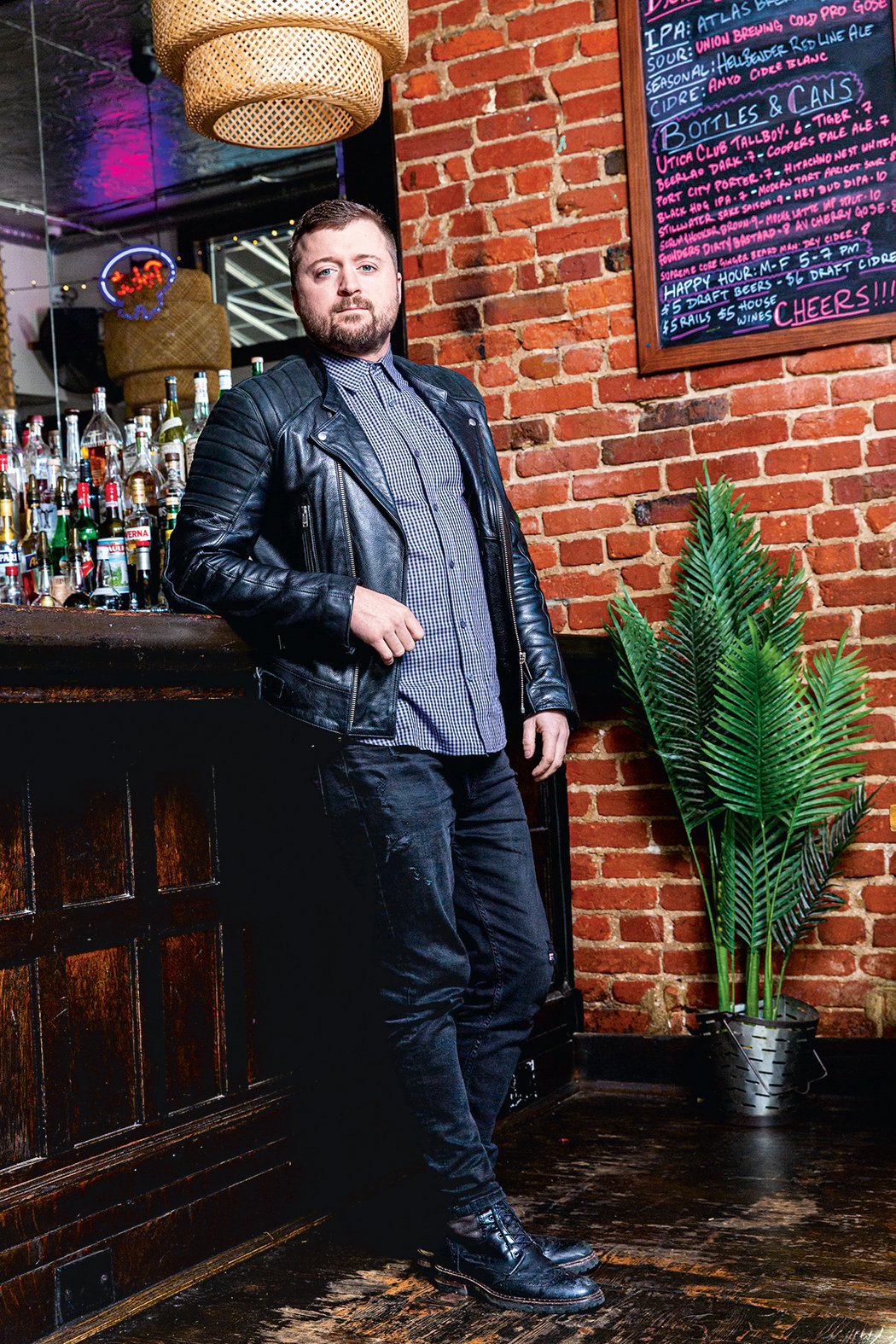
Charles Paret’s big idea, meanwhile, is to build the tiny houses of restaurants. The 33-year-old with a background in construction is the main investor in chef Alex McCoy’s Adams Morgan burger joint, Lucky Buns, and runs an investment-and-development company called Coloma River. His “micro-concepts” will fit within 300-square-foot ATM vestibules or garages. One’s a Peruvian-chicken stand called Chop Shop, another a Thai street-food counter dubbed Som Tam that’s already in Union Market. Every worker, he says, will eventually have a 401(k) and health-care options: “With retention rates, you’re going to create better culture in your restaurants. And it makes people want to go there.”
Back at the Dabney, Conner is also keen to talk up the do-gooder ways his investments could help society. “It’s just like public-school teachers, right? You can be deeply passionate about something, care so much about something, and not get rewarded for it at all. It’s crazy,” Conner says. “And I can’t help the public-school teachers. If I knew how, I would. But I do know how to help restaurant-industry workers. Or I think I do. Or at least I can treat the people who work in the restaurants that I want to be a part of in a way that’s at the very least humane. And that’s why I’m doing this.”
As we settle the check, he pulls out a huge wad of cash. “Most young people, they only do cards. I usually do cash, because tipping, it’s nicer. It’s easier when you just do it in multiples of $20 and then just walk away.” He leaves close to a 30-percent tip. Then it’s on to the next amazing meal. Hell, yeah.
This article appears in the April 2020 issue of Washingtonian. After it was published and quarantine began, food editor Jessica Sidman collected updates on the restaurants’ status. Here’s where things stand as of July 2020:
Chef Kevin Tien split from Emilie’s in June, and Johann Moonesinghe has put an additional $100,000 into the restaurant. “I’m being very selective about the restaurants that I’m financing, but most people I know are not financing restaurants at all,” Moonesinghe says. “There’s a massive pullback of any kind of financing for restaurants, which I don’t know how long that lasts.”
Patty Sung is balancing full-time childcare with looking to launch a tech startup in education or serving the elderly. She’s also been chipping in at Flight, including cleaning up the bar and helping with service test-runs for reopening.
Charles Paret’s low-budget micro-concepts have turned out to be perfectly suited to the new takeout-centric dining landscape. He has plans for five more this year. “It’s funny, I’m opening more locations now probably than ever,” Paret says. “Literally the only model that I’ve seen that now works is the one model that everybody was laughing at before.”
Reverie switched from fine-dining to takeout burgers when the pandemic hit but recently brought back a patio-only tasting menu. Chef Johnny Spero says his millennial investors, including Iggy Jacome, have been a source of emotional support and a sounding board for how to make diners feel safe during the reopening.
Manuel and Juan Carlos Figueredo pivoted their app TidBit into a delivery guide when dining rooms shut down. Seven Reasons has since reopened—and fared better than most restaurants. The business has hired back most of its staff (under a new pay model with $17-per-hour starting wage) and launched a series of employee-run pop-ups.
Christian Conner has been taking online wine courses and decamped to a rental in Rappahannock County with a pool and a zebra, before heading to Martha’s Vineyard and Nantucket. Conner says this crisis hasn’t stopped him from wanting to invest further: “I want to be there for whatever new things happen, because I’m sure there are enough smart, industrious chefs and hospitality folks. They’re going to find ways to survive… Fine-dining will always survive. Rich people are always going to be spending money.”
*This story has been updated to reflect that Conner is not an investor in the Shaw restaurant Oyster Oyster.
